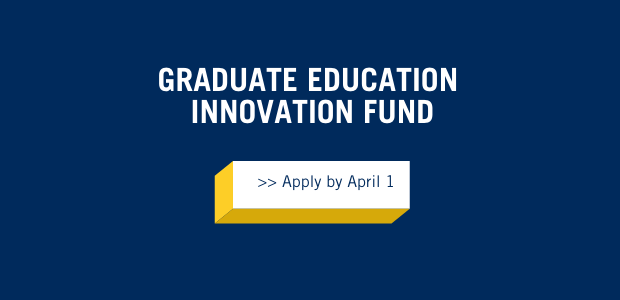Seeding Innovation in Graduate Education

The School of Graduate Studies’ Graduate Education Innovation Fund (GEIF) is seeking proposals for its second cycle of funding in April 2022. The new initiative aims to support innovation in curriculum, teaching, and mentorship at the graduate level to create structural changes and incent program renewal. The three-year pilot project opened its first round of applications in October 2021 with five seed grants of $5000 each, and another five grants on offer in April 2022.
“Through the Graduate Education Innovation Fund, we want to support creative methods to revitalize our programs and better train the future generation of change-makers,” says Vina Goghari, Vice-Dean, Research and Program Innovation at the School of Graduate Studies.
Proposals funded through this initiative show that graduate innovation at the University of Toronto can take myriad of exciting forms. One funded proposal led by Dr. Angela Mashford-Pringle, Associate Director of the Waakebiness-Bryce Institute for Indigenous Health, will develop land-based Indigenous health graduate courses for the Master’s in Public Health – Indigenous Health degree. With the support of the GEIF, Dr. Pringle will redesign a number of the program’s core courses to integrate Indigenous land-based learning (e.g. Indigenous food systems and traditional ecological knowledge), trauma-informed communication, and relationship-building with Indigenous community organizations.
Another project, the Sound Lab, based at the Institute for the History & Philosophy of Science & Technology, aims to train graduate students in audio-based media like podcasting, audio documentaries and experimental sound recording with an eye toward helping them disseminate their research outside of traditional text-based media. Led by Dr. Rebecca Woods, an Assistant Professor in the Faculty of Arts & Science, the project was born out of a graduate seminar in Fall 2020, when COVID-related library closures led Dr. Woods to swap the final research assignment for a student-produced podcast. She hopes the Sound Lab will be a first step in preparing students for the career opportunities available through the rise of podcasting and web-based audio production.
To be considered for funding, submissions to GEIF must address one of the following key themes: professional development; experiential learning; interdisciplinary learning; Indigenous ways of knowing; diverse cultural perspectives; decolonization, anti-oppression, and anti-racism; global perspectives; effective mentorship; or public scholarship. The proposals must also show promise of scalability or transferability to other graduate learning environments.
“These are some focus areas where innovation and thoughtful experimentation can really enhance outcomes for our students,” says Goghari, who chairs the adjudication committee alongside two graduate students and two faculty members. “Broadly speaking, re-imagining graduate education to empower our trainees to take on the key question of societal need are the greater goals of our communities, our university, and our students. And program innovation, to me, is about aligning structures and systems to meet those goals.”
Goghari is looking forward to how these proposals can scale up over time. The Graduate Innovation Education Fund is the first initiative of its kind dedicated to the specific needs of graduate program innovation from the School of Graduate Studies. “We received 17 applications in the fall. It’s very heartening to see the enthusiasm, creativity, and dedication of our graduate community to providing our students the best academic and professional experience,” she says. “Working in this way, from the small-scale and local intervention to something larger, will help us make a meaningful long-term impact.”
The list of Fall 2021 GEIF winners also includes:
- The MedGen IDP – A Web-Based IDP Tool for Non-PhD Students (led by Dr. Erin Styles, Director, MHsc program in Medical Genomics and Assistant Professor, Teaching Stream, Temerty Faculty of Medicine)
- Social media to enhance research productivity and impact (led by Dr. Lydia Wilkinson, Assistant Professor, Teaching Stream, Faculty of Applied Science & Engineering)
- Research toolkits for multiculturalism diversity and diversity research in a multidisciplinary context (led by Dr. Sherry Yu, Department of Arts, Culture, and Media (UTSC), and Faculty of Information); and
- The Summer Psychology Research Initiative (SPRINT) – a high-school outreach program where graduate students can develop teaching resources and deliver lectures (led by Dr. Elizabeth Page-Gould, Graduate Chair, Psychology, Faculty of Arts & Science).
Applications for the Graduate Education Innovation Fund are due on April 1, 2022. The School of Graduate Studies welcomes applications from faculty members across the university. Learn more and apply.
